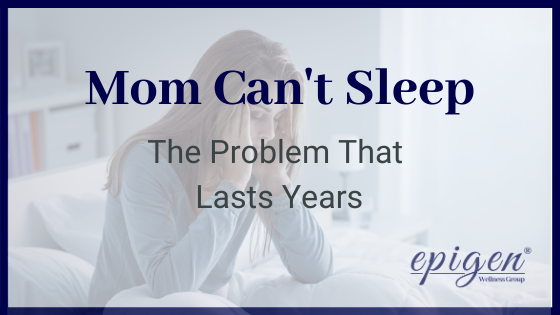Have you heard the one about the mom who can’t sleep and runs on coffee before noon and wine after noon? Well, it’s not funny to me. Far too many mothers are chronically stressed and sleep deprived. I’ve had enough. These mothers deserve support, not to be left to suffer alone.
If you’re a mom who wants to drink coffee and wine daily – absolutely no judgement here. However, you should not feel like you must fuel with caffeine and alcohol just to get by. Moms deserve to sleep well, to enjoy life, not suffer through it.
Now, let’s back up.
How did sleep deprivation become the norm for moms?
The newborn phase has quite a reputation for sleepless nights, especially for moms. Sadly, many moms continue to suffer from sleep deprivation years after postpartum (Sivertsen et al., 2015; Sivertsen et al., 2017).
Insomnia is classified as difficulty falling asleep, staying asleep, returning to sleep, or getting quality, restful sleep. Insomnia plagues 60% of women during postpartum (Sivertsen et al., 2015), 59% of women during perimenopause, and 63% of women at some point during their lifetime (Ciano et al., 2017). Comparatively, only 30% of the general population, including women and mothers, suffers from chronic insomnia (Roth, 2007).
I can’t tell you how many (way too many) mothers of grown kids, even grandmothers, have told me they haven’t slept well since before they had babies. There’s a common story: mom is awake with a newborn at night, baby starts sleeping through the night and mom is… wide awake. This continues as the baby grows into a child, and then into an adult. Why can’t mom sleep? It’s often an active mind, lots of thoughts, things to do, and worries.
This brings us to stress.
Moms have a lot of responsibilities, and a lot on their minds. From nutrition to social and emotional development to education, kids have needs. This can be stressful, especially when combined with other stresses of life. Stress plays a big role in insomnia. It makes it harder to fall asleep and increases the likelihood of waking up in the middle of the night or too early in the morning. No wonder mom can’t sleep! Even if there are several consecutive hours of sleep, stress wreaks havoc on sleep quality. To add to the problem, women need more sleep per night than men, at least eight hours.
Sleep loss and stress are detrimental to physical and mental health. Anyone who is suffering from chronic stress or insomnia knows that all too well. Even so, mothers tend to fall into a trap of sacrificing their own wellbeing for their kids. The irony of this is that maternal stress and sleep loss is harmful for kids (Ward & Lee, 2020; McQuillan et al., 2019).
All too often moms want to be the hero and sacrifice for the family. The truth is that self-prioritization is heroic and best for families.
Insomnia and stress are common among women and mothers. Just because a problem is common does not make it normal. Chronic sleep deprivation and chronic stress are symptoms, not a necessary part of motherhood. Mom jokes are a form of accepting maternal suffering as a cultural norm. They contribute to the act of brushing the problem under the rug. We should be motivated to make improvements!
So, what can we do instead of cracking jokes and continuing the status quo?
The good news is that parents can improve life for themselves and their kids at the same time. That’s right, we don’t have to sacrifice ourselves for the benefit of our kids, because this is really detrimental in the long run.
When it comes to sleep, the first step is to make it a priority. It’s important to work as family to come up with a plan that works for everyone. How can each person get their needs met when scheduling bedtimes and wake times? It’s quite simply impossible for everyone to get enough sleep if anyone is required to stay up late and wake up early to get things done. Do the math! Parents setting the example with actions help to encourage kids to maintain healthy sleep habits, too.
Mom can’t sleep: “My kids are asleep but my mind is racing!”
So, what if sleep won’t come at the scheduled time? That’s more complicated, but there are some things that help.
Here are some steps to take when moms can’t sleep:
- Figure out the cause of the problem. It’s important to determine why sleep won’t come. What’s at the root of the problem?
- Reduce stress. Is there a stress component? If so, schedule time throughout the day to do the things that reduce stress. Again, this provides a great example to show kids how to manage their stress – one of the most important skills for kids to learn.
- Stick to a routine. Following a bedtime routine can be helpful to signal to the brain that it’s time to sleep. This is a great way to increase quality family time and build stronger relationships.
- Seek support. Sometimes the simple sleep and stress tips aren’t enough. Let’s be honest; sometimes they don’t even scratch the surface of the problem. If that’s the case, seek support from a qualified professional.
No one is hopeless when it comes to improving stress and sleep. While it’s great to catch these things early to prevent years of suffering, it’s never too late.
Looking for more sleep and stress tips? Here are some resources:
https://www.epigenwellness.com/stress/
https://www.epigenwellness.com/insomnia/
https://www.epigenwellness.com/sleep-tips/
Epigen Wellness Group’s RESTED program was awarded “Most In-Depth and Comprehensive Sleep Program” by the ghp Healthcare and Pharmaceutical Awards! Click HERE to learn more about the RESTED program.
References
Ciano, C., King, T. S., Wright, R. R., Perlis, M., & Sawyer, A. M. (2017). Longitudinal study of insomnia symptoms among women during perimenopause. Journal of Obstetric, Gynecologic & Neonatal Nursing, 46(6), 804-813.
McQuillan, M. E., Bates, J. E., Staples, A. D., & Deater-Deckard, K. (2019). Maternal stress, sleep, and parenting. Journal of Family Psychology.
Roth, T. (2007). Insomnia: definition, prevalence, etiology, and consequences. Journal of clinical sleep medicine, 3(5 suppl), S7-S10.
Sivertsen, B., Hysing, M., Dørheim, S. K., & Eberhard-Gran, M. (2015). Trajectories of maternal sleep problems before and after childbirth: a longitudinal population-based study. BMC pregnancy and childbirth, 15(1), 129.
Sivertsen, B., Petrie, K. J., Skogen, J. C., Hysing, M., & Eberhard-Gran, M. (2017). Insomnia before and after childbirth: the risk of developing postpartum pain—a longitudinal population-based study. European Journal of Obstetrics & Gynecology and Reproductive Biology, 210, 348-354.
Ward, K. P., & Lee, S. J. (2020). Mothers’ and fathers’ parenting stress, responsiveness, and child wellbeing among low-income families. Children and Youth Services Review, 116, 105218.

